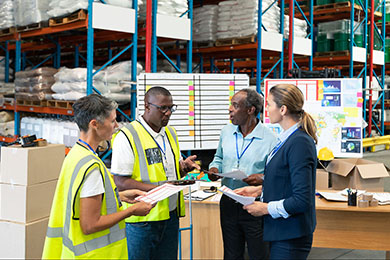

We worked with three trailblazing employers to introduce flexibility into hard-to-flex frontline roles and tracked the impact with the Institute for Employment Studies.

By Dr Sarah Dauncey, Head of Partnerships and Insight, Timewise
Since the pandemic, numerous studies have highlighted the benefits of hybrid and remote working for employees. Hybrid working models have been found to have positive impacts on workers, especially in relation to health and happiness. While it’s great to see this evidence showing the value of place-based flexibility, what about the millions of workers who can’t access it? The majority of the workforce (60%) are site-based and shouldn’t miss out on the advantages associated with having autonomy and control over working patterns, including improved health and work-life balance.
For too long, the UK workforce has been divided between those who can access flexibility and those who can’t. This divide was amplified through the pandemic, and we’re still reeling from the effects of this – with high levels of sickness absence and rising economic inactivity largely attributed to poor health.
For frontline and site-based workers, there has been limited coordinated action to redress workplace inequalities. And with the new government promising to make flexible working the default from day one, it’s critical we understand how to do this in site-based roles and build the evidence to incentivise employers to take action.
In 2022, we initiated a programme to address this inequity in access to flexible working by partnering with the Institute for Employment Studies and with the backing of Impact on Urban Health. We approached three employers who we knew were committed to taking their flexible working agenda forward, Guy’s and St Thomas’ NHS Foundation Trust, Sir Robert McAlpine and Wickes. Over the course of the programme, Timewise supported each employer to introduce greater flexibility into frontline roles and the Institute for Employment Studies tracked the effect of these interventions. We wanted to test whether good quality work would improve employee health and wellbeing, and lead to benefits for employers, such as improved retention.
The institute of Employment Studies led an independent evaluation of the work and found that flexibility gave rise to a number of positive outcomes.
But perhaps the best way to demonstrate the impact of the programme is through the voices of those involved:
A Store Manager from Wickes, said: “The trial has made me appreciate my job more, and (if possible) has made me even more loyal to Wickes, as I have the best work-life balance I have ever had in all the years I have been at Wickes.”
While a Quantity Surveyor from Sir Robert McAlpine, said: “If I hadn’t been given this opportunity, I think the conversation would have been about going part-time. I couldn’t cope with balancing childcare and a full-time job. Financially that would have had a very negative impact on me. I wouldn’t have been in a good place mentally and I probably wouldn’t be as productive.”
Through our programme and its evaluation, we’ve gained some valuable insights for other organisations looking to introduce flexibility for frontline and site-based employees.
For our participating organisations, there’s no going back to former ways of working. They’ve embraced the changes and are scaling up to ensure that everyone can benefit through increased input and control over their working pattern. For example, since participating in the programme, Wickes has widenened access to flexible options to all their store managers across the UK.
All three employers demonstrated that listening to employees and taking the initiative to increase flexible working opportunities – despite the operational challenges of doing so – delivers rewards. They are vanguards of flexible working in critical sectors, offering learnings for other organisations to benefit from.
Our programme provides much needed evidence to drive action among employers and improve workplace and health equity for frontline and site-based workers. Flexible working is not just an option for knowledge workers – it’s a way of working that should be and can be available to all.
Published July 2024